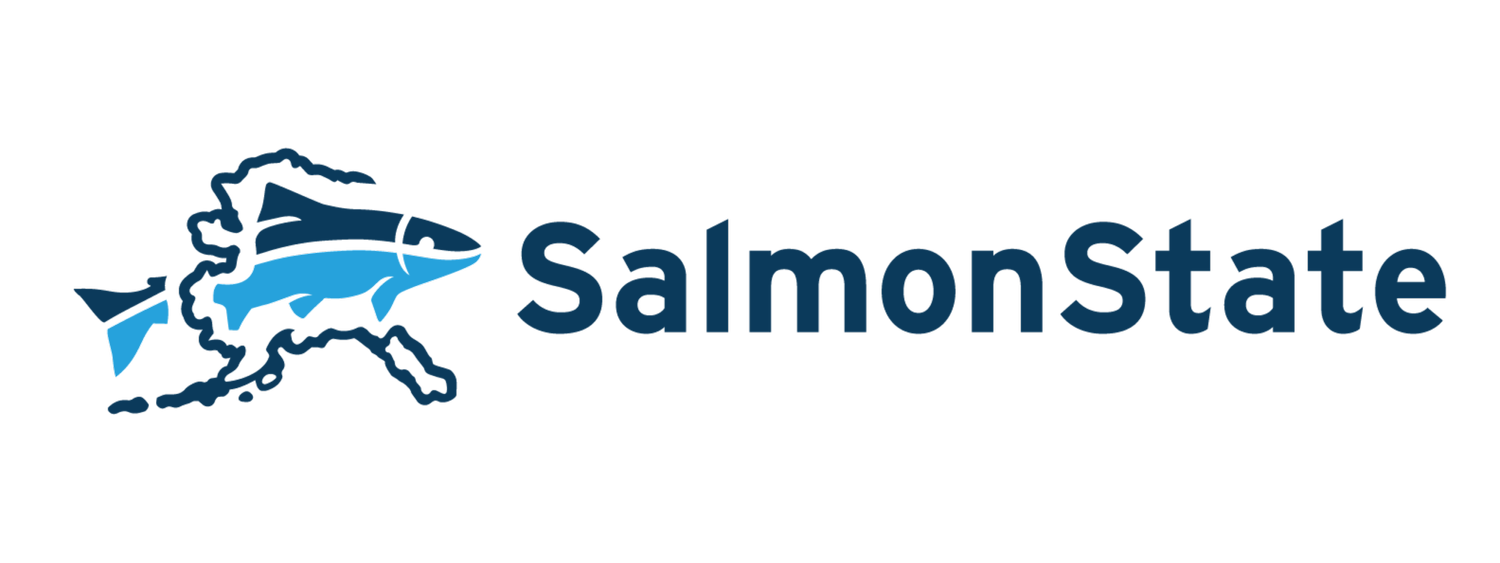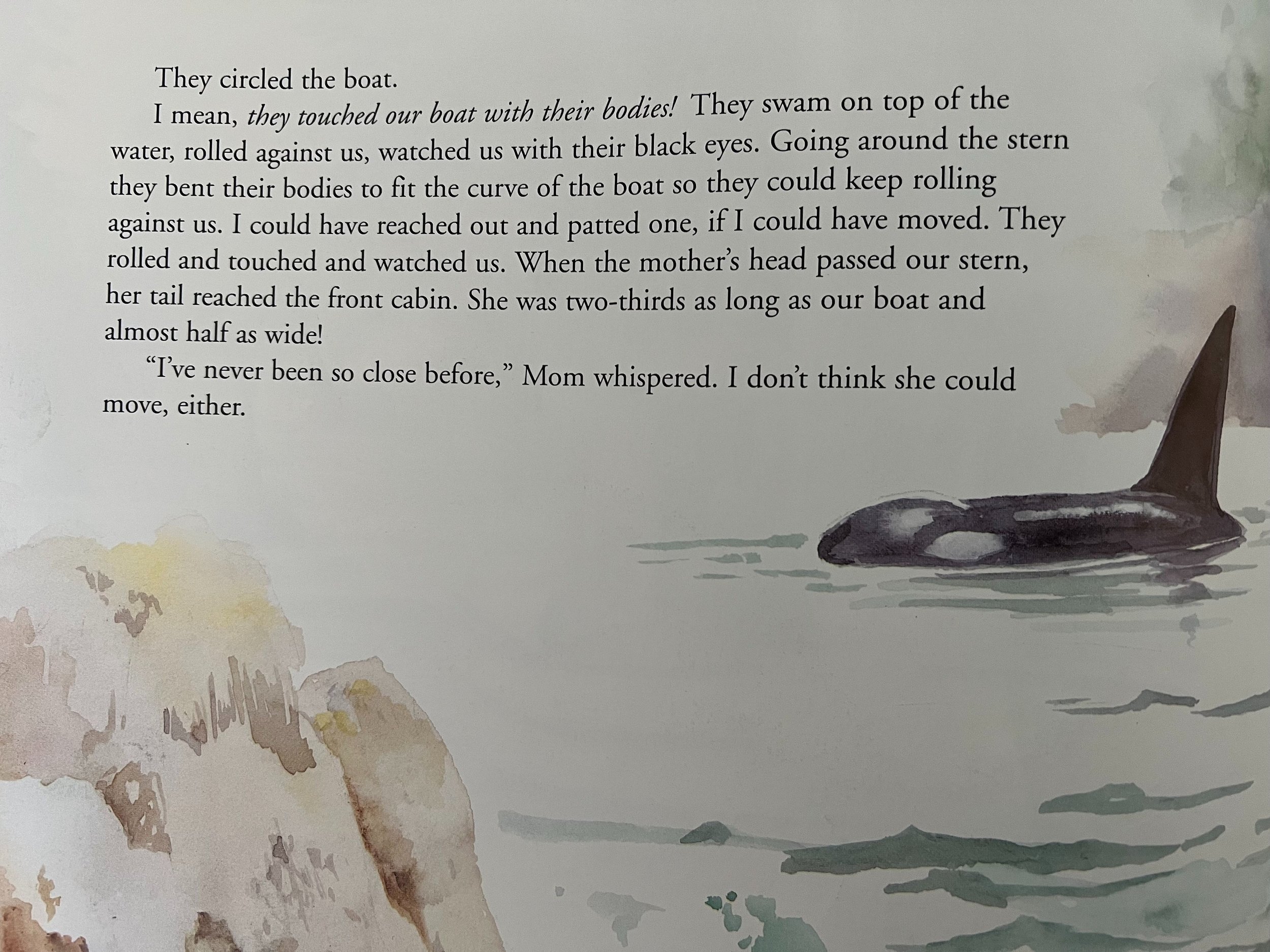Taiga Bell
Southeast Alaska trolling families are threatened by a misguided lawsuit from the Wild Fish Conservancy, a Seattle-based organization that alleges Southeast Alaska small-boat, family fishermen are negatively impacting Puget Sound killer whales. This is a dangerous distraction from the real threats to wild salmon and orcas in Washington - habitat destruction, contamination, and dams.
These stories are from spring of 2023. In August 2024, the 9th U.S. Circuit Court of Appeals overturned a District Court decision that could have temporarily halted troll fishery, ruling that the lower court had “abused its discretion.”
Troller Taiga Bell with his son, Ronin, daughter, Kira, and a coho salmon.
Debra Page, Taiga’s mother, with her grandson Ronin
The cover of the children’s book Debra wrote about trolling and orcas, “Orcas Around Me.” She dedicated it to her sons Taiga and Ryland, who grew up trolling.
An illustration in the book “Orcas Around Me,” by Debra Page, illustrated by Leslie W. Bowman. The book is written from the perspective of Taiga Bell, Debra’s son.
A passage in the children’s book “Orcas Around Me,” written by Southeast Alaska troller Debra Page, from the perspective of her son, Taiga Bell. Taiga Bell is now also a troller.
Killer whales in Southeast Alaska. Killer whale populations in locations other than the Salish Sea have increased in recent years.
“Until we were probably 10, 12 years old, my brother and I fished on my mom's trolling boat. She just had a little 20-foot wood boat and two kids on it running around. She would tie us off to the mast sometimes.
I have lots of great memories of it. It was not the way everybody grows up, but that's how we grew up. On a fishing boat every day. And as we got a little older, my brother and I would take turns on my dad's boat.
Growing up on a troller, it seemed like a good way to make a little money when I was in my early twenties. I bought a boat for real cheap and got out there. I loved it so much that I didn't pursue my other dreams. I just became a fisherman, and then I bought this boat, the Triad, five years ago.”
—Taiga Bell, lifelong troller, F/V Triad
Taiga’s son Ronin with a king salmon.
Part of the Southeast Alaska fishing community of Elfin Cove as seen from above (bottom left of image).
Amy Nye, Taiga’s wife, with a king salmon and her son, Ronin.
Taiga Bell with his son, Ronin, and daughter, Kira.
“My family — they live in Elfin Cove in the summers, in the tiny fishing community out on the coast, and they come out with me when they can. It’s really nice having them out on the boat and passing on the knowledge that I have to the next generation. I just love having them on the boat.
Growing up fishing, it's incredibly important to me and, and my peers out there that these salmon are around for future generations for, for us, for the rest of our lives. It's how we make our livelihood. So, healthy rivers and healthy stocks of salmon are incredibly important to me and to my friends out there.
We're not looking to catch all the fish in the sea. We're looking to make a lifetime of making a living off the ocean. And if they need to cut fishing back a little bit to make that a sustainable possibility, that's okay with me.”
—Taiga Bell, lifelong troller, F/V Triad
“When I first heard about the lawsuit that the Wild Fish Conservancy was putting against trolling, I didn't really take it seriously. I heard that they were saying that Alaska trollers were impacting a pod of killer whales in Puget Sound. And to me, it didn't make much sense because it's a long ways away. There's a lot of other factors that are affecting those killer whales.
As a lifelong salmon troller, we’re not the problem. Yes, I've caught a lot of king salmon. But a lot of other environmental factors play into these killer whales, their loss in population. There's pollution and noise in Seattle and boat traffic. There's so many things that are so much closer to home. I mean, you have trawling, which is dragging a huge net around. And those guys are gonna catch a lot more fish than I ever will in my whole life. And then you have an international trawl fleet out there. That's actually a problem, you know, they’re less regulated and are huge boats and big nets.
I think that if they're targeting somebody that are a fishery that's causing a problem it's not trolling. We're the smallest fish in the sea. We're the little guy, and the family-owned boat.
I just — I didn't take it too seriously. And then months went by and I got a text from my brother saying ‘We're losing our jobs. It's this lawsuit.’”
—Taiga Bell, lifelong troller, F/V Triad
Taiga Bell with his son, Ronin, and a salmon.
“In trolling, you're dealing with these fish individually. It's the highest quality salmon you can get in the whole world, this wild Alaskan troll caught salmon. When you're taking the time and the care with each fish, you actually actually care about each fish. We're trying to make a living with the ocean. We want these fish to be around. And I find it hard to believe that a judge down in Washington can decide to take that away. I just hope that the truth of it all comes out and people see that it's a bunch of families up here that are working real hard to make a living.
We're environmentalists ourselves. We're hoping that this is a sustainable thing for our children.
Shutting down a fishery isn't the answer. Working together to find how we can make the salmon stocks stronger is a better answer.”
—Taiga Bell, lifelong troller, F/V Triad












